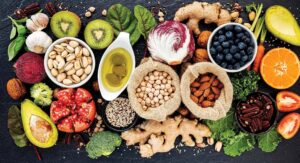Boost Your Immune System Naturally: 15 Science-Backed Foods for Cold Season 2026
Introduction (Boost Your Immune System)
Cold season is here, and your immune system needs all the help it can get. While no single food can magically prevent illness, eating the right nutrients can make your immune system stronger and more ready to fight off germs.
Recent research from 2026 shows that the design of our immune system is complex and influenced by an ideal balance of many factors, not just diet, and especially not by any one specific food or nutrient. However, certain foods contain powerful vitamins, minerals, and antioxidants that support your body’s natural defense system.
This article will show you 15 science-backed foods that can help strengthen your immunity during cold season. All recommendations are based on the latest scientific research and explained in simple terms.
Understanding Your Immune System 
Your immune system works like your body’s personal army. It fights off harmful bacteria, viruses, and other germs that try to make you sick. To work properly, this system needs specific nutrients from the food you eat.
The immune function of the human body is highly influenced by the dietary intake of certain nutrients and bioactive compounds present in foods. When you don’t get enough of these nutrients, your immune system becomes weaker and less able to protect you.
The Science Behind Immunity-Boosting Nutrition
Scientists have studied how different nutrients affect immune function. K8ey dietary components such as vitamins C, D, E, zinc, selenium and the omega 3 fatty acids have well-established immunomodulatory effects, with benefits in infectious disease.
These nutrients work in different ways:
- Antioxidants protect immune cells from damage
- Vitamins help immune cells communicate and work properly
- Minerals support the production of new immune cells
- Healthy fats reduce inflammation that can weaken immunity
15 Science-Backed Immunity-Boosting Foods
1. Citrus Fruits (Oranges, Lemons, Grapefruits)
Citrus fruits are packed with vitamin C, one of the most important nutrients for immune health. Feeding your body certain foods, such as citrus, turmeric, and ginger, may help keep your immune system strong.
How much to eat: One medium orange or grapefruit daily provides about 70-90mg of vitamin C.
Easy ways to include: Add lemon to water, eat an orange as a snack, or drink fresh grapefruit juice.
2. Red Bell Peppers
Red bell peppers contain even more vitamin C than citrus fruits. One cup of chopped red bell peppers gives you about 190mg of vitamin C – that’s more than double what you get from an orange.
Bonus nutrients: They also contain beta-carotene, which your body converts to vitamin A for additional immune support.
3. Broccoli
Broccoli is a superfood for immune health. It’s loaded with vitamins A, C, and E, plus fiber and many antioxidants. The key is not to overcook it – light steaming keeps the most nutrients.
Serving tip: Aim for 1 cup of broccoli 3-4 times per week.
4. Garlic
Garlic has been used as medicine for thousands of years. It contains compounds like allicin that have antimicrobial and immune-supporting properties. Studies show that people who eat garlic regularly get sick less often.
How to use: Add fresh garlic to cooking, or try roasted garlic as a spread.
5. Ginger
Ginger may help keep your immune system strong. It has anti-inflammatory properties that can help reduce sore throat and other inflammatory illnesses.
Simple recipe: Make ginger tea by steeping fresh ginger slices in hot water for 10 minutes.
6. Spinach
Spinach is rich in vitamin C, antioxidants, and beta-carotene. Like broccoli, it’s healthiest when cooked as little as possible to preserve nutrients.
Easy addition: Add fresh spinach to smoothies, salads, or sandwiches.
7. Yogurt
Look for yogurts with “live and active cultures” printed on the label. These probiotics help keep your gut healthy, and since about 70% of your immune system is in your gut, this is crucial for overall immunity.
Choose wisely: Plain Greek yogurt is best – avoid sugary varieties that can actually weaken immune function.
8. Almonds
Almonds, walnuts, sunflower seeds, and flaxseeds are excellent sources of Vitamin E, zinc, and omega-3 fatty acids, which support immune function and reduce inflammation.
Vitamin E is an antioxidant that protects cells, including immune cells, from oxidative damage. Evidence suggests vitamin E supports optimal immune function.
Perfect portion: About 1/4 cup (23 almonds) provides your daily vitamin E needs.
9. Sunflower Seeds
Sunflower seeds are full of nutrients including phosphorus, magnesium, and vitamins B-6 and E. While vitamin E supplementation can increase risk for bleeding and stroke, dietary intake is perfectly safe.
Snack idea: Sprinkle sunflower seeds on salads or eat a small handful as a snack.
10. Turmeric
Turmeric may help keep your immune system strong. This bright yellow spice contains curcumin, which has powerful anti-inflammatory effects.
Usage tip: Add turmeric to soups, stews, or make golden milk (turmeric latte).
11. Green Tea
Green tea is packed with flavonoids, a type of antioxidant. It also contains EGCG (epigallocatechin gallate), another powerful antioxidant that enhances immune function.
Daily amount: 2-3 cups of green tea daily is optimal for immune benefits.
12. Papaya
Papaya is loaded with vitamin C – one medium papaya has more than double the daily recommended amount. It also contains papain, a digestive enzyme with anti-inflammatory effects.
Serving suggestion: Eat fresh papaya chunks or blend into smoothies.
13. Kiwi
Like papayas, kiwis are naturally full of essential nutrients including vitamin C, vitamin K, and folate. These nutrients support immune function and overall health.
Fun fact: Two medium kiwis provide more vitamin C than an orange.
14. Poultry (Chicken and Turkey)
When you’re sick, chicken soup isn’t just comfort food – it actually helps. Poultry is high in vitamin B-6, which is important for many immune system reactions.
Immune bonus: The broth from cooking chicken bones contains gelatin and other nutrients that support gut and immune health.
15. Shellfish
Some types of shellfish are packed with zinc, a mineral your immune system needs to function properly. Zinc and protein are essential building blocks for a robust immune system.
Best choices: Crab, clams, lobster, and mussels are all high in zinc.
Important note: Don’t overdo zinc – too much can actually hurt immune function.
Key Nutrients for Immune Health
Vitamin C
- Daily need: 65-90mg for adults
- Best sources: Citrus fruits, bell peppers, strawberries, broccoli
- Why it matters: Helps immune cells work properly and protects against damage
Vitamin D
To support immune function during COVID-19 disease higher dietary intakes of vitamins D, C and E, zinc and omega-3 fatty acids could be beneficial. Many people don’t get enough vitamin D, especially in winter.
- Food sources: Fatty fish, egg yolks, fortified milk
- Sun exposure: 10-30 minutes of midday sun several times per week
Zinc
Adequate supply of zinc, selenium, and vitamin D is essential for resistance to other viral infections, immune function, and reduced inflammation.
- Daily need: 8-11mg for adults
- Best sources: Oysters, beef, pumpkin seeds, chickpeas
- Warning: Don’t take more than 40mg daily from all sources
Selenium
Research indicates that low selenium levels can compromise immune function and potentially exacerbate the progression of certain viral infections. Brazil nuts are one of the richest dietary sources, but selenium can also be found in fish, eggs, and whole grains.
- Daily need: 55mcg for adults
- Easy source: Just 2 Brazil nuts provide your daily selenium needs
Vitamin E
- Daily need: 15mg for adults
- Best sources: Nuts, seeds, vegetable oils
- Benefit: Protects cells, including immune cells, from oxidative damage
How Much Should You Eat?
Aim for five to nine servings of vegetables and fruits daily to provide those immune-boosting vitamins, minerals and antioxidants.
Here’s what counts as one serving:
- Fruit: 1 medium piece, 1 cup berries, or 1/2 cup canned fruit
- Vegetables: 1 cup raw or 1/2 cup cooked
- Leafy greens: 2 cups raw
Foods to Limit During Cold Season
While focusing on immune-boosting foods, also limit foods that can weaken your immune system:
Sugar: High sugar intake can suppress immune function for hours after eating Processed foods: Often lack nutrients and may contain harmful additives
Excessive alcohol: Can interfere with immune cell function Trans fats: Found in some fried and packaged foods, these promote inflammation
Lifestyle Tips for Strong Immunity
Food is just one part of immune health. A healthy diet along with these preventive steps can keep your immunity in tip-top shape: Exercise: Working out regularly reduces your chance of getting a cold by 20 to 30 percent.
Additional immune-supporting habits:
- Get 7-9 hours of sleep nightly
- Manage stress through relaxation techniques
- Wash hands frequently
- Stay hydrated with water and herbal teas
- Don’t smoke or use tobacco products
Special Considerations
Mediterranean Diet Benefits: The Mediterranean diet, breastfeeding, and microbiota-targeted therapies have emerged as effective strategies to enhance immune resilience.
Individual Needs: Some people may need more of certain nutrients based on age, health conditions, or lifestyle factors. Consider talking to a healthcare provider about your specific needs.
Supplement Caution: Many products on store shelves claim to boost or support immunity. But the concept of boosting immunity actually makes little sense scientifically. Focus on getting nutrients from whole foods first.
Sample Daily Meal Plan for Immune Health
Breakfast:
- Greek yogurt with berries and almonds
- Green tea
Lunch:
- Spinach salad with bell peppers and sunflower seeds
- Grilled chicken breast
- Orange slices
Snack:
- Kiwi fruit and a small handful of nuts
Dinner:
- Salmon with steamed broccoli
- Sweet potato
- Ginger tea
Conclusion
Supporting your immune system doesn’t require expensive supplements or complicated meal plans. By including a variety of nutrient-rich foods in your daily diet, you can give your body the tools it needs to stay healthy during cold season.
Remember that vitamins C and D, zinc, and protein are essential building blocks for a robust immune system, while antioxidant-rich foods help protect your cells from damage.
Start by adding just a few of these 15 immune-boosting foods to your meals each day. Small changes in your diet, combined with good sleep, regular exercise, and proper hygiene, can make a big difference in how well your immune system protects you.
The key is consistency – make these nutritious foods a regular part of your eating routine, not just when you feel a cold coming on. Your immune system works best when it has steady access to the nutrients it needs all season long.
Read more: Complete 30-Day Anti-Aging Transformation Guide: Science-Based Natural Methods


